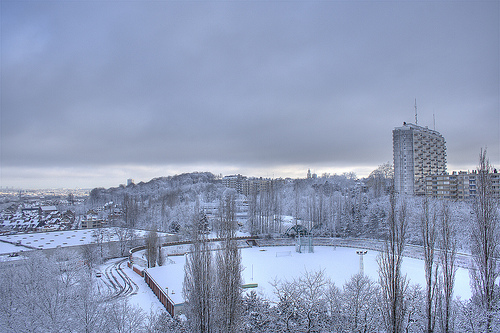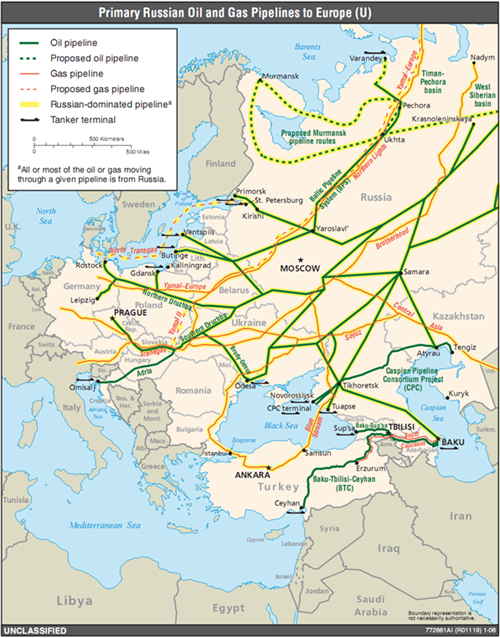
The landmark pipeline deal recently signed between Russia and China connecting the Siberian oil fields with Daqing should send cold chills up Europeans’ spines. It may very well mean they will be literally cold in the foreseeable future.
To say that Europeans depend on Russia for their oil and natural gas is so understated that it would be more surprising to say you need eggs to make an omelet. According to the US Department of Energy, in 2005 Europe was a net importer of ten million barrels of crude per day. Although some of it came from the North Sea, Libya and Saudi Arabia the vast majority originated in Russia. The map below of European pipeline infrastructure best shows the depth of the European addiction.

Courtesy U.S. Department of Energy
Because their local oil and gas sources are fully developed, any additional energy growth for Europe in the foreseeable future must be imported and because of the oil transportation infrastructure, any significant additional imports for the foreseeable future must come from Russia.
China’s appetite for new sources of oil is beyond voracious. Its oil imports for 2004 soared nearly 35% to 2.1 million barrels of oil per day and just two years later U.S. Energy Information Administration estimated that China will consume 8 million barrels of oil daily. The Institute for the Analysis of Global Security projects China’s need for energy to increase by 150 percent by 2020. Presently, its oil consumption is growing by 7.5% per year, seven times faster than the U.S.
This need for crude is fueled by the amazing economic expansion China enjoys. The Institute estimates China’s real gross domestic product is growing at a rate of 8-10% a year. This means that as long as the Chinese economy continues to grow at that break-neck speed it will need new sources of oil to provide the energy that growth will need to sustain it. More importantly, it also means they will have the ready money to pay for it.
Russia’s main source of import income is its petroleum. They have hitched their “modernization wagon” to the knowledge of this dependable income. Recessions or even depressions may come and go, economies may slow but there is always a need for crude to flow. Thinking realistically, all other things being equal Russia would prefer a trade partner with the best growth potential because that future oil demand will means more income for the recovering Rodina.
This new deal with China may be the beginning of Russia’s formal recognition of where that real future growth will occur. It also acts as a hedge against any Europe enacting a fuel embargo for bad political behavior. Neither bodes well for the European Union.
Soon, like the North Sea oil fields, Russia production will peak and stabilize at a sustainable level. China’s demand for oil will continue to grow long after that occurs. When it does, each additional barrel of oil China demands could be one less barrel of oil Europe receives from Russia. It will definitely mean the price of each barrel of oil will rise as demand outstrips supply. China’s feast may mean Europe’s famine.
Now is the time for the European Union to find other sources for their energy needs both present and future. Whether it is alternative fuels or additional suppliers with infrastructure that supports the change, Europe must find a way to alter its current trajectory. Without a rejuvenated, flexible energy strategy the existing path will lead to higher energy prices, economic stagnation, lower standards of living, and some very cold winters ahead.
Christopher Harness is a senior fellow at the Atlantic Council. The views expressed here are solely his own, not those of any U.S. government agency. Photo by Flickr user Chuck Nhorus published under Creative Commons license.
Image: brussels-snow.jpg

